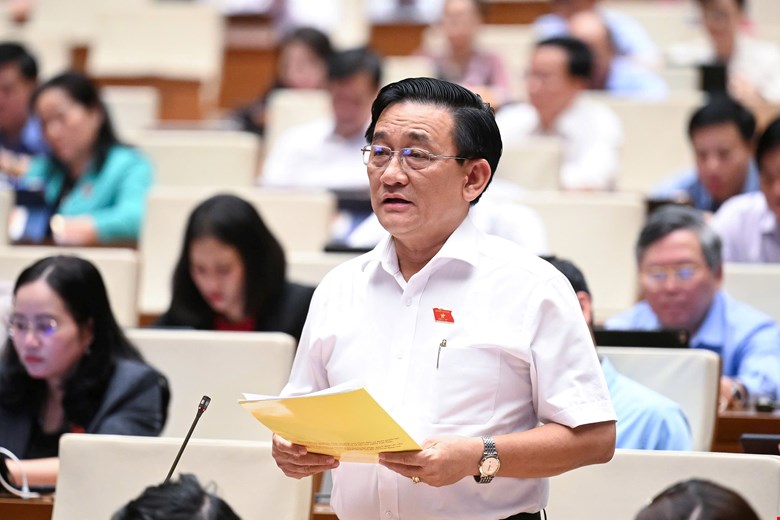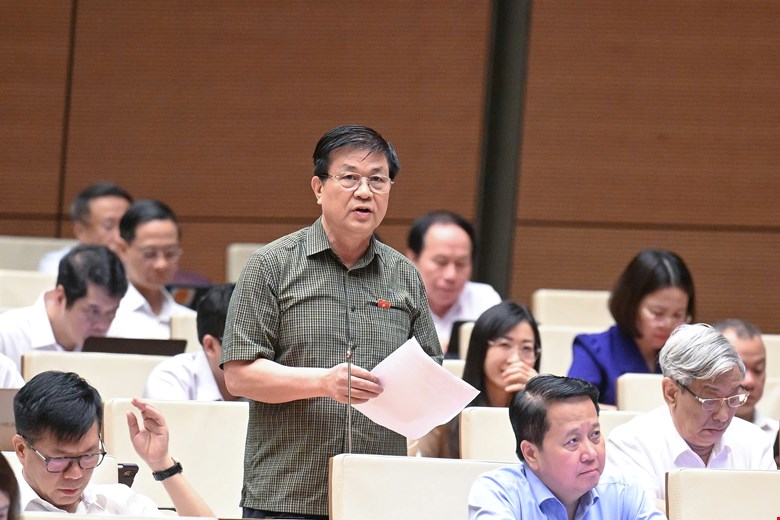Continuing the 9th Session, on the morning of May 28, the National Assembly discussed in the hall the draft Law amending and supplementing a number of articles of the Law on Energy Efficiency and Savings Use.
Cool weather but many administrative buildings are still air conditioned
National Assembly delegate Tran Quoc Tuan (Tra Vinh delegation) said that amending and supplementing a number of articles of the Law on Energy Efficiency and Savings is very necessary, of great political significance to the commitment to achieve net emissions of "0" by 2050, contributing to ensuring national energy security, reducing social costs, improving competitiveness to meet the requirements of sustainable development in the new period.

Emphasizing that construction is one of the most energy-consuming industries today, delegate Tran Quoc Tuan cited that according to the World Bank (WB), the construction industry accounts for more than 36% of total global energy consumption and over 40% of CO2 emissions.
In Vietnam, more than 60% of the electricity of buildings is used for air conditioning and lighting, mainly due to the use of ineffective materials.
Pointing out the reality that "Although the outside is very cool, the inside of the building using glass is still air conditioned", delegate Tran Quoc Tuan suggested: "If we use insulating glass that is good, has a standard energy label, it will save electricity and avoid wasting money, including avoiding wasting the state budget".
However, he also acknowledged that when implementing this regulation in Vietnam, it will not be avoided that difficulties such as lack of criteria and national standards for many types of materials; the number of standard testing rooms is still small; testing costs are high and the post-inspection mechanism is weak.
Therefore, Mr. Tuan suggested that when labeling energy for construction materials, the Government should issue a roadmap for mandatory labeling for a number of construction materials that have a great impact on electricity consumption such as glass, insulation materials, construction materials, etc. In addition, build a system of Vietnamese energy efficiency standards for construction materials in sync with international standards; socialize testing and certification activities; regulate the application of QR-code in the production of this material to track energy trademark; have a post-inspection regime, strictly handle cases of intentional violations, etc.
"We do not let businesses climb mountains alone but lack ropes," the delegate compared.
In addition to the above solutions, Mr. Tuan also mentioned the development of the energy service company ( UNESCO) model. The delegate emphasized that this is a model that is beneficial to both sides, saving to save electricity bills, and investing to get more profits. If there is no incentive mechanism soon, we will miss a great opportunity.
"In Vietnam, there are currently about 200 small enterprises operating under this model but "all are strong and all are weak". The main reason is the lack of financial support and credit guarantees for ESCO businesses, because businesses cannot buy electricity with confidence; due to the lack of an independent measurement and monitoring system" - Mr. Tuan said.
Proposal to publicize enterprises violating labeling
National Assembly delegate Do Ngoc Thinh (Khanh Hoa delegation) said that regulations on energy labeling and information disclosure are necessary but lack a mechanism for inspection, supervision, and special compliance in e-commerce.

Therefore, the delegate proposed to add regulations on the responsibility of management agencies in periodically checking and handling violations for businesses that do not comply with energy labeling, especially on e-commerce platforms, and to have specific regulations on publicizing the list of businesses that violate to protect consumers.
Regarding strengthening sanctions for violations, the draft Law assigns People's Committees at all levels to be responsible for inspecting and handling violations, but according to delegate Do Ngoc Thinh, the sanctions level or penalty framework for violations in energy use has not been clearly regulated.
Therefore, the delegate proposed to supplement regulations on administrative fines or specific handling such as revoking licenses and suspending operations for key energy-using facilities that do not comply with regulations on energy saving.
"This will increase deterrence and effectiveness of implementation" - the delegate emphasized.











